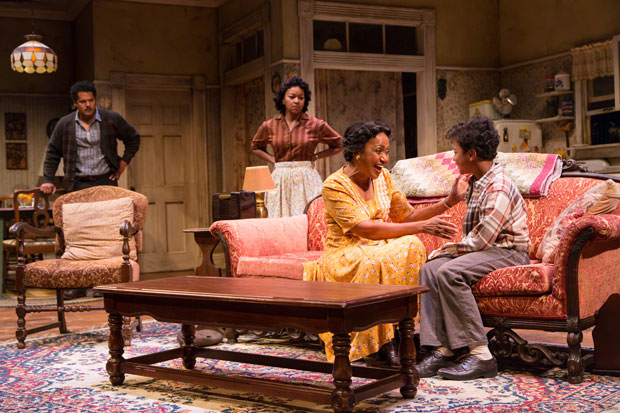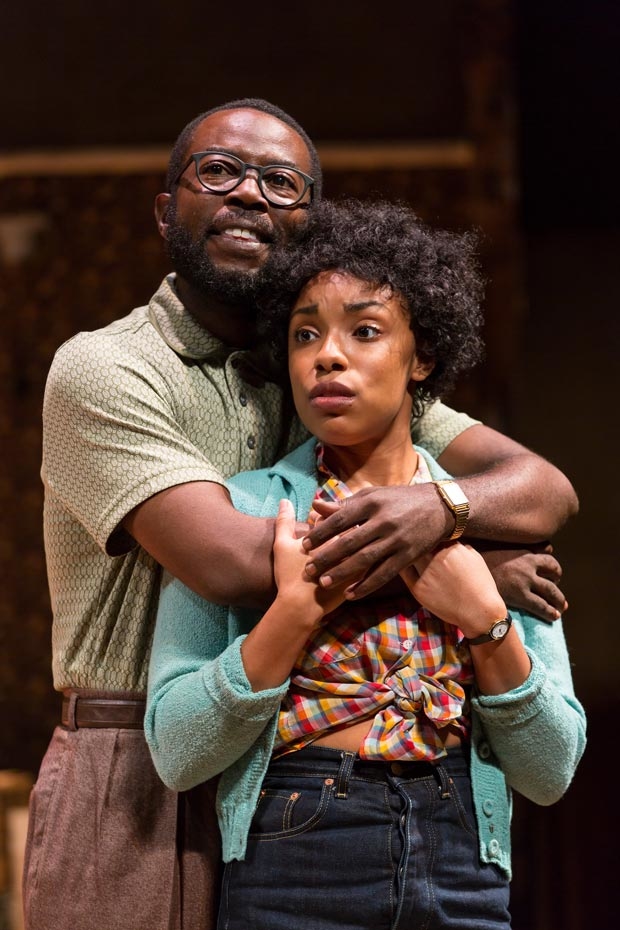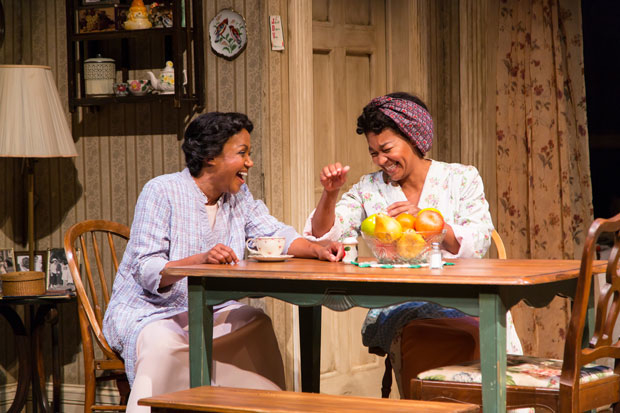A Raisin in the Sun
Two River Theater revives a timely, powerful American classic.

(© T. Charles Erickson)
Ever since Lorraine Hansberry's A Raisin in the Sun premiered on Broadway in 1959, the play has resonated with Americans grappling with persistent racial bigotry and injustice. In our own incendiary times, Raisin remains essential theater. The play has been revived around the country following a Broadway run in 2014 starring Denzel Washington, but Two River Theater's new staging, starring a magnificent cast led by Brandon J. Dirden, is as excellent a production of A Raisin in the Sun as you will ever see.
The play, whose title comes from Langston Hughes's poem "Harlem" ("What happens to a dream deferred? / Does it dry up / Like a raisin in the sun?"), revolves around the Youngers, a black family living in a tidy but time-worn 1950s Chicago apartment (impressively detailed set by Christopher and Justin Swader). The family's matriarch, Lena (Brenda Pressley), is expecting a large insurance check following the death of her husband, and the family members have their own dreams for how they'd like to spend it.
Lena's son, Walter Lee (Dirden), would like to own his own liquor store, and her daughter, Beneatha (Jasmine Batchelor) longs to be a doctor. Walter Lee's wife, Ruth (Crystal A. Dickinson), wants to escape the dreary confines of their apartment and live in a better place. But when the opportunity comes to make these dreams come true, racist neighbors and dishonest friends strain the family's bonds of loyalty and test the limits of what the Youngers are willing to sacrifice for a small slice of the elusive American dream.

(© T. Charles Erickson)
A Raisin in the Sun is one of the most richly textured plays in the American canon. Its many themes include not just the financial and racial challenges faced by the Youngers, but also the family's individual struggles to discover their identity and self-worth in a white-dominated society that either marginalizes or excludes them. Hansberry's brilliantly paced moments of humor, tenderness, and heartrending despair, along with some of the best theater dialogue ever written, blend together with symphonic elegance.
Director Carl Cofield and his creative team prove their command of the richly layered material with a beautifully detailed and nuanced production. Along with the exquisite set, Kathy A. Perkins's lighting augments the sepia-toned dreariness of the Younger household, and Karin Graybash's sound design highlights touching moments between Walter Lee and Ruth as they dance together like they once did long ago. Elivia Bovenzi's costumes, too, contrast the muted colors of 1950s working-class attire with the lively richness of the African apparel that Beneatha wears in her quest to discover her heritage.
From the opening scene, in which Ruth enters and heaves a sigh of every exhausted wife and mother who ever existed, to the devastating second act finale between an enraged Lena and her dream-crushed son, Dirden, Pressley, and Dickinson are masterful. Dirden gives a tremendous performance as Lee, who finds himself a victim of black and white selfishness, as well as his own. Dickinson (Dirden's real-life wife) captures the frustration of a woman whose life seems about to suffocate her. Pressley, in a tour de force portrayal, gives us the indomitable mother Lena, who, sometimes with little more than her faith and a firm embrace of her children, manages to hold her family together.
The rest of the cast shines as well. Batchelor's Beneatha, the identity-seeking intellectual, shows both strength and vulnerability, especially in the presence of her suitors, the Nigerian Joseph Asagai, played with mesmerizing charm by Charlie Hudson III, and the wealthy George Murchison, played with cool aloofness by York Walker. Nat DeWolf is terrific as the cagey, double-talking Karl Lindner, whose diffidence masks his racist agenda. Willie Dirden (Brandon's father) also makes a heartbreaking appearance as Bobo, the bearer of the bad news that dashes Walter Lee's dreams. And the young actor Owen Tabaka, making his stage debut as Travis, receives solid laughs.
It's disheartening that so much of Hansberry's play still rings true today. But the play's strength lies also in its deep probing of the human heart and the small things that motivate us all and give us hope. It is a testament to Hansberry's genius and her deep love of humanity that her play will endure even after that longed-for day when we care less about the color of a person's skin than about the content of their character.

(© T. Charles Erickson)







